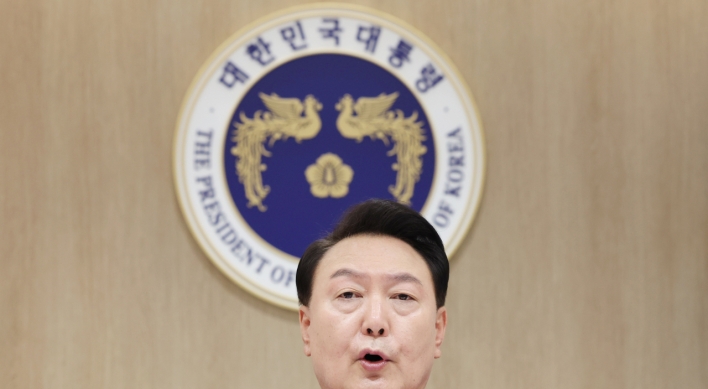Forex pressure looms over Korea's outbound investments
By Son Ji-hyoungPublished : March 24, 2020 - 17:11

Facing a weakening local currency amid the escalating novel coronavirus crisis, companies are hedging their cross-border investment plans, including mergers and acquisitions, filings showed Tuesday.
The deals denominated in foreign currency are facing increasing exchange rate pressure. as some of the investment decisions were made before the coronavirus outbreak.
Over the past three weeks, South Korea’s local currency has weakened 4.6 percent against the greenback and fell 2.4 percent against the euro, according to the Seoul Money Brokerage.
The recent volatility -- in spite of the global monetary easing policies -- has increased the risks for Korean companies who could lose nearly 10 billion won ($8 million) in a single transaction, compared to their initial financial plans.
One of the deals is Hotel Shilla’s purchase of Travel Retail Group Holdings shares, operator of 3Sixty Duty Free.
Hotel Shilla’s $121 million deal to buy a 44 percent stake in Travel Retail will cost at least 9.5 billion won more than its initial plan announced in October if the Korean won continues to fall from Tuesday session’s close. Hotel Shilla has yet to unveil the due date for deal closure.
Another dollar-denominated acquisition deal waiting to be closed is a $95 million acquisition of NIS Indra Fund by NXC, holding company of game developer Nexon, and lifeboat maker HLB’s acquisition of Immunomic Therapeutics.
Some are carrying out capital injections into their foreign affiliates. Hyosung Heavy Industries and Hyosung Chemical raised $100 million for its US unit and a $45 million capital increase for its Vietnamese arm, respectively.
Also affected by the forex fluctuation are euro-denominated deals, including GS Engineering & Construction‘s acquisition of Polish prefab housing firm Danwood and SK Global Capital’s acquisition of France-based Arkema‘s functional polyolefin operations.
Some of the Korean buyers, however, have strived to minimize the impact. AJ Networks managed to skirt the forex exposure by wrapping up a deal earlier than the scheduled date in a fundraising plan for a US affiliate. It closed the transaction on March 16, earlier than the March 31 deadline, but still paid an extra 90 million won as the Korean won weakened over the course of three weeks. But otherwise, it could have paid sevenfold additionally, as of Tuesday closing.
Analysts suggest that the disruption in the forex market could persist until April or later.
“We expect the currency forex volatility to continue until the mid-second quarter, given the unease in short-term forex market and global financial instability,” Kim Hyo-jin, economist at KB Securities, said in a recent note.
“While the recent currency swap between Korea and the US could contain the widening of the volatility, concerns still linger on the stronger greenback and another acute market fluctuation, which would drag the Korean won down further.”
By Son Ji-hyoung (consnow@heraldcorp.com)
The deals denominated in foreign currency are facing increasing exchange rate pressure. as some of the investment decisions were made before the coronavirus outbreak.
Over the past three weeks, South Korea’s local currency has weakened 4.6 percent against the greenback and fell 2.4 percent against the euro, according to the Seoul Money Brokerage.
The recent volatility -- in spite of the global monetary easing policies -- has increased the risks for Korean companies who could lose nearly 10 billion won ($8 million) in a single transaction, compared to their initial financial plans.
One of the deals is Hotel Shilla’s purchase of Travel Retail Group Holdings shares, operator of 3Sixty Duty Free.
Hotel Shilla’s $121 million deal to buy a 44 percent stake in Travel Retail will cost at least 9.5 billion won more than its initial plan announced in October if the Korean won continues to fall from Tuesday session’s close. Hotel Shilla has yet to unveil the due date for deal closure.
Another dollar-denominated acquisition deal waiting to be closed is a $95 million acquisition of NIS Indra Fund by NXC, holding company of game developer Nexon, and lifeboat maker HLB’s acquisition of Immunomic Therapeutics.
Some are carrying out capital injections into their foreign affiliates. Hyosung Heavy Industries and Hyosung Chemical raised $100 million for its US unit and a $45 million capital increase for its Vietnamese arm, respectively.
Also affected by the forex fluctuation are euro-denominated deals, including GS Engineering & Construction‘s acquisition of Polish prefab housing firm Danwood and SK Global Capital’s acquisition of France-based Arkema‘s functional polyolefin operations.
Some of the Korean buyers, however, have strived to minimize the impact. AJ Networks managed to skirt the forex exposure by wrapping up a deal earlier than the scheduled date in a fundraising plan for a US affiliate. It closed the transaction on March 16, earlier than the March 31 deadline, but still paid an extra 90 million won as the Korean won weakened over the course of three weeks. But otherwise, it could have paid sevenfold additionally, as of Tuesday closing.
Analysts suggest that the disruption in the forex market could persist until April or later.
“We expect the currency forex volatility to continue until the mid-second quarter, given the unease in short-term forex market and global financial instability,” Kim Hyo-jin, economist at KB Securities, said in a recent note.
“While the recent currency swap between Korea and the US could contain the widening of the volatility, concerns still linger on the stronger greenback and another acute market fluctuation, which would drag the Korean won down further.”
By Son Ji-hyoung (consnow@heraldcorp.com)



















